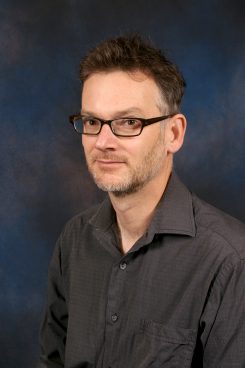
Symmetry and Representation in Physics
13 - 26 May 2017
Professor Belot's primary interests are in philosophy of physics, philosophy of science, metaphysics, and epistemology. He is especially interested in questions about the nature of space and time in modern physics. Much of his recent work concerns the challenge that underdetermination of theory by evidence poses for learning from data in science and elsewhere. His current work concerns general relativity, cosmology, and boundary conditions, addressing the following questions. In what sense is time homogeneous in general relativity? To what extent was Einstein correct to think that the distribution of matter determines spacetime geometry? What connection is there between the symmetries of general relativity and problems about black hole evaporation? What are time and physics like in a universe with dark energy?
Professor Belot is currently Professor of Philosophy at the University of Michigan, having previously taught at Princeton University, New York University, and the University of Pittsburgh. He has held a post-doctoral fellowship from the Social Sciences and Humanities Research Council and fellowships from the National Science Foundation, the American Council of Learned Societies, and the Center for Advanced Study in the Behavioral Sciences. His book, Geometric Possibility, won the 2014 Lakatos Award. Professor will be visiting Bristol with his partner Professor Ruetsche.
Symmetry and Reality: Boundary Conditions
Symmetries have long played a special role in philosophical and scientific investigations of the nature of space, time, and matter: from Plato's argument for the immobility of the Earth; through Huygens's argument for the laws of impact and the debate between Leibniz and Newton about the nature of space and time; to the great discoveries in particle physics of the twentieth century. There has been a resurgence of philosophical work on symmetries in recent years, driven in part by engagement with foundational questions arising in general relativity and in quantum field theory and in part by considerations arising in debates about the nature of scientific representation and between realists and anti-realists about science. This research sub-project will focus on the interpretative, methodological, and metaphysical implications of symmetry principles with a particular focus upon the role of boundary conditions in general relativity and cosmology.
Symmetry and Reality: Renormalization
Pragmatic approaches to metaphysics and the philosophy of science take seriously the possibility that contingent features of the context of inquiry shape the content of theories. One question they raise is: how much does the success of current physics tell us about physical reality, and how much does it tell us about us? One contingent feature of the context of inquiry is our ignorance: we don’t, right now, know what the world is fundamentally like. One strategy for identifying what successful physics tells us about reality, notwithstanding our ignorance, is to identify features of successful physics invariant under a wide range of ways we might be ignorant. This symmetry strategy is supported by the Renormalization Group analysis of the interacting quantum field theories comprising the Standard Model, the paradigm of successful physics. Ruetsche’s research sub-project is to articulate and critically engage this strategy.
During his stay in Bristol, Professor Belot will be hosted by Professor James Ladyman (Philosophy), and will be involved with the following research events:
Research Workshop 'The Physics of Ignorance'
Open to all including talks from Professors Belot and Ruetsche. This workshop will bring together the Bristol philosophy and foundations of physics community as well as members of the UK philosophy of physics community. Talks will include Bristol staff in Physics and Philosophy as well as an external speaker. Funds will be requested from the British Society for the Philosophy of Science to cover the costs of the external speaker.
Master-class
Lead by Professor Ruetsche, will take the form of a graduate student seminar for MSci/MA students in Philosophy of Physics. There are currently 10-12 students who could be expected to attend. The topic will be the one covered by Ruetsche’s 2011 book: the philosophy of quantum field theory. Using the familiar problematics of the philosophy of ordinary quantum mechanics as a launchpad and counterpoint, the seminar will articulate what’s philosophically new about QFT -- what question arise there that lack counterparts in ordinary QM – as well as introduce technical tools (operator algebras and axioms for physical theories couched in their terms) for adjudicating those questions.
Philosophy of Science for Science Teachers Session
Lead by Professor Belot and will take the form of an afternoon or evening event involving a short talk and discussion relating to realism and science, focusing both on the sort of problems that arise, in fields such as geophysics and medical imaging, when we attempt to determine the internal structure of a body from measurements made exterior to it, and on the global question whether similar problems might bedevil the project of science as a whole, thought of as the attempt determine the structure of unobserved parts of the world from measurements made in observed parts. The event will be promoted with local science school teachers, ECRs from the science faculty and PGCE students from the Graduate School of Education.
Dates and times tbc